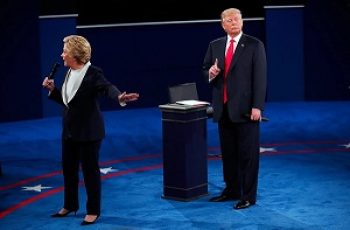Ad Blocker Detected
Our website is made possible by displaying online advertisements to our visitors. Please consider supporting us by disabling your ad blocker.
Trump’s Bold Border Strategy: Can It Guarantee His 2024 Comeback?
Trump’s Bold Border Strategy: Can It Guarantee His 2024 Comeback?. Donald Trump’s political rise was powered by a populist message that resonated deeply with a significant portion of the American electorate. One of the central pillars of his 2016 presidential campaign was a hardline stance on immigration, particularly his pledge to “build the wall” along the U.S.-Mexico border. This message, encapsulated in a simple yet powerful slogan, became a rallying cry for his supporters and symbolized his promise to restore what many saw as lost national sovereignty. Fast-forward to 2024, and Trump is once again banking on immigration, border security, and his “law and order” rhetoric to propel him back into the White House.

The Border in Trump’s 2016 Campaign
To understand Trump’s reliance on the border issue in 2024, it’s important to look back at how it shaped his political identity in 2016. During that campaign, Trump tapped into a growing frustration among Americans who believed that the government had failed to control illegal immigration. His focus on the U.S.-Mexico border came at a time when debates over immigration reform had reached a fever pitch, with concerns about national security, job displacement, and cultural change dominating political discourse. Trump’s promise to build a physical barrier was symbolic of a broader pledge to restore control over immigration.
In 2016, Trump’s message was straightforward: illegal immigration was eroding American sovereignty, costing jobs, and making the country less safe. He accused Democrats, and even many Republicans, of being complicit in a broken system, either by advocating for “open borders” or by failing to take meaningful action to secure the country. By framing himself as the only candidate willing to take the necessary steps to secure the border, Trump distinguished himself from his primary opponents and later from his general election opponent, Hillary Clinton.
His speeches often featured vivid descriptions of crime and violence perpetrated by undocumented immigrants, including high-profile cases that became central talking points in his rallies. For instance, Trump frequently referenced incidents involving members of the MS-13 gang, which he said were emblematic of the threat posed by unchecked immigration. These anecdotes, coupled with his portrayal of border security as a national crisis, resonated with many voters who felt that existing immigration policies were too lenient.
Trump’s Bold Border Strategy: Can It Guarantee His 2024 Comeback?
Trump’s border wall was more than a policy proposal; it was a symbol of his broader vision for American strength and sovereignty. The simplicity of his message allowed it to cut through the noise of the campaign and connect with voters on an emotional level. For many, the wall represented not just a physical barrier, but a metaphorical line in the sand—defending the United States from external threats, preserving jobs for American workers, and restoring a sense of order.
The Evolving Debate on Immigration During Trump’s Presidency
Once in office, Trump made immigration one of the key focal points of his administration. While his border wall did not materialize to the extent he had promised—due in part to legislative and legal challenges—he still pursued a number of policies aimed at curbing both legal and illegal immigration. These included the “zero tolerance” policy that led to the separation of families at the border, increased deportations, restrictions on asylum claims, and efforts to end programs like Deferred Action for Childhood Arrivals (DACA).
However, Trump’s presidency did not mark the end of the border debate. If anything, it escalated the polarization of the issue. His policies, while applauded by his base, were met with fierce opposition from Democrats and immigration advocates who accused him of cruelty and xenophobia. The images of children separated from their parents at detention facilities became a flashpoint, galvanizing opposition to his immigration agenda and raising questions about the moral implications of his policies.
Despite these controversies, Trump remained steadfast in his belief that strong immigration enforcement was central to his political appeal. He repeatedly claimed that his administration had made the border more secure and that his policies had stemmed the tide of illegal immigration. Even as criticism mounted, Trump maintained that his approach was necessary to protect American jobs, reduce crime, and safeguard national security.
In the 2020 election, Trump once again emphasized the importance of border security, though the COVID-19 pandemic and economic concerns somewhat overshadowed immigration as a central issue. Nonetheless, Trump continued to argue that his policies were the only effective solution to a border crisis that he claimed had been exacerbated by his predecessors. His loss in 2020 did little to shake his conviction that immigration—and the border in particular—remains one of his strongest political weapons.
Trump’s Border Strategy in 2024
As Trump seeks the presidency once more in 2024, he is returning to the issue that helped define his first campaign: the U.S.-Mexico border. This time, Trump is doubling down on the idea that securing the border is not only crucial for national security but also central to preserving American culture and economic stability. He is positioning himself as the candidate who can “finish the job” and fully realize the vision he laid out in 2016.
The circumstances surrounding the border in 2024 are different from those of 2016, yet Trump sees familiar dynamics at play. Under the Biden administration, the U.S. has seen a surge in migrant crossings at the southern border, with an influx of asylum seekers and undocumented migrants attempting to enter the country. This rise in border activity has become a lightning rod for political debate, with Republicans accusing the administration of failing to enforce immigration laws and Democrats defending a more humane approach to immigration.
Trump has seized on these developments to reinforce his narrative that the border remains out of control and that only his tough policies can restore order. In speeches and public statements, Trump has described the Biden administration’s handling of immigration as a disaster, arguing that the current president’s policies have led to chaos at the border. He frequently highlights the rise in migrant crossings, as well as incidents involving drug trafficking and violent crime, as evidence of the need for a more aggressive approach to border security.
Also Read: Trump Shocks California
One key difference in 2024 is the role of fentanyl and other drugs in the immigration debate. Trump has increasingly framed the border not just in terms of illegal immigration but also in terms of the flow of dangerous substances into the United States. By linking the border to the opioid crisis, Trump is broadening the appeal of his message to include voters who may not prioritize immigration but are concerned about public health and safety.
The Border Wall as a Political Symbol
Even though the border wall remains incomplete, Trump has not abandoned the idea. In fact, he is using it as a symbol of his unfinished business and his commitment to fulfilling his promises. Trump has repeatedly stated that, had he been re-elected in 2020, the wall would have been completed, and the border would be fully secure. He frames the wall as not only a solution to illegal immigration but also a symbol of American strength and determination.
Trump’s rhetoric about the wall also serves as a broader metaphor for his presidency. He often portrays himself as a political outsider who faced resistance from both Democrats and Republicans in Washington, making the incomplete wall a symbol of the establishment’s failure to support his agenda. By framing his re-election campaign as a chance to “finish the job,” Trump is appealing to voters who feel that his first term was undermined by political obstructionism and that only a second term will allow him to fully implement his vision.
The Risks of Focusing on the Border
While Trump’s border message remains powerful among his core supporters, it also carries risks. The immigration debate is deeply polarizing, and Trump’s hardline stance may alienate voters who view his policies as too extreme or inhumane. In the 2020 election, suburban voters, women, and minority groups moved away from Trump, and there is a possibility that a continued focus on the border could further alienate these key demographics.
Moreover, the broader political landscape in 2024 may require Trump to address other pressing issues, such as the economy, healthcare, and climate change. While immigration is an important issue for many voters, it may not be the top priority for those who are more concerned about inflation, job security, or the ongoing recovery from the COVID-19 pandemic. A singular focus on the border could limit Trump’s appeal among voters who are looking for a candidate with a more comprehensive platform.
In addition, Trump’s focus on immigration may be less effective if his Democratic opponents, particularly Joe Biden, can counter his narrative with concrete evidence of progress on the border or improvements in immigration policy. If the Biden administration can point to lower numbers of illegal crossings or successful reforms, Trump’s border message may lose some of its potency.
Conclusion
Donald Trump’s reliance on the border issue in 2024 reflects both the success of his 2016 campaign and his continued belief that immigration is a winning issue for him. He sees the border as a symbol of his broader message: that America must be strong, sovereign, and secure. By returning to the themes that propelled him to victory in 2016, Trump hopes to recapture the energy of his original campaign and mobilize his base to win the White House once again.
However, the political landscape in 2024 is different from that of 2016. While the border remains a contentious issue, Trump’s focus on immigration could limit his appeal among voters who prioritize other issues or who view his policies as too extreme. Nonetheless, Trump’s conviction that the border got him elected in 2016—and that it can do so again in 2024—will likely continue to shape his campaign strategy as he seeks to regain the presidency.


No Responses